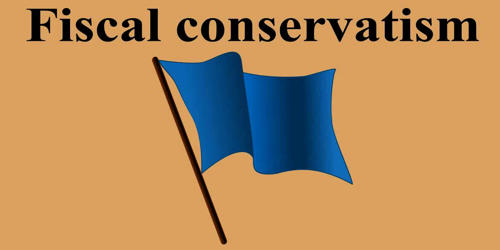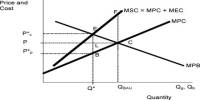Fiscal conservatism is the belief that the economy functions best with minimal governmental influence. It is a political and economic philosophy regarding fiscal policy and fiscal responsibility advocating low taxes, reduced government spending, and minimal government debt. They are proponents of free-market capitalism – the belief that capital (usually defined as money) is best allocated without government direction. Free trade, deregulation of the economy, lower taxes, and privatization are the defining qualities of fiscal conservatism. Fiscal conservatives believe that individuals and companies can best respond to the demands of consumers, instead of a government bureaucrat.
Fiscal conservatism follows the same philosophical outlook of classical liberalism and economic liberalism. For example, fiscal conservatives oppose socialized medicine, where the government decides how much doctors make, what treatments are allowed, and millions of other decisions. The term has its origins in the era of the New Deal during the 1930s as a result of the policies initiated by modern liberals, when many classical liberals started calling themselves conservatives as they did not wish to be identified with what was passing for liberalism. Instead, fiscal conservatives believe that competition between doctors, hospitals, clinics, and pharmaceutical companies will produce the lowest-cost, highest-quality care.
Fiscal conservatism is the economic philosophy of prudence in government spending and debt. In the United States, the term liberalism has become associated with the welfare state and expanded regulatory policies created as a result of the New Deal and its offshoots from the 1930s onwards. Supporters of fiscal conservatives can have different names and comprise different groups. Fiscal conservatives form one of the three legs of the traditional conservative movement that emerged during the 1950s together with social conservatism and national defense conservatism. National conservatism concentrates more on national interests than standard conservatism, and it upholds cultural and ethnic identity. As such, national conservatives can be distinguished from economic conservatives, for whom free-market economic policies, deregulation, and fiscal conservatism are the main priorities.
Most fiscal conservatives are members of the Republican Party, although some may be members of the Libertarian Party. Fiscal-conservative is one who favors a balanced budget, preferring spending cuts or tax increases to borrowing, and wants to decrease government size and promote a free market. Many Americans who are classical liberals also tend to identify as libertarian, holding more socially liberal views and advocating a non-interventionist foreign policy while supporting lower taxes and less government spending. Because of its close proximity to the United States, the term has entered the lexicon in Canada. In many other countries, liberalism or economic liberalism is used to describe what Americans call fiscal conservatism.
















